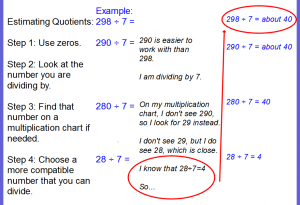Did You Know…? Puffins are faster than giraffes (top speed of 50 mph vs 33 mph).
In Math today we continued to work on estimating quotients. We have been working at using compatible numbers and front-end rounding to help us estimate the answers to division problems. Today we wrote a procedure that students could use, and practiced it. Take a look at our procedure and an example below:
Please make sure that students review this procedure and finish their practice problems before Monday.
For our Science Fair check-in today, students were asked to have selected their projects and to have done some initial research. They should also have thought about narrowing down their topic to a specific question or problem – the essential question. What is the essential question? In our logbook, it describes the question as:
“The question I am trying to answer is: (be specific)”
The essential question should require that instead of simply looking up an answer, you conduct your own research in order to create an original answer. For our Science Fair projects, this research is usually conducting your experiment and tracking your observations and results.
Asking how, what if, should, or why can be a good way to structure an essential question.
Here is an example: You really find the subjects of plants interesting and decide to do research on botany. Through your research, you narrow down your topic to a smaller area of interest – seed germination (sprouting). Next, consider the relationship between sprouting and another variable. How about temperature? This will suggest a question that you can use to form an essential question: How does temperature affect the rate of seed germination?
Use this checklist to help test your essential question:
- Will you be measuring change in the variable studied (example – seed germination)?
- Will you change the other variable (example – temperature)?
- Can you find background information on the subject?
- Will you be able to collect enough data?
- Can you get all the materials quickly?
- Do you have time to do the experiment at least twice?
If you can answer yes to the above, you are on your way to creating a strong Science Fair project!
Check out this article on education.com (http://www.education.com/reference/article/Ref_How_Develop_Project/) for more ideas on narrowing your research down into an essential question. Our next Science Fair check-in will be next Thursday, January 23rd. Students have been asked to consider the above and use the checklist to test the strength of their essential question. Then on Thursday, they may bring in any questions they still have about writing a question and about writing a hypothesis.
Agenda:
Read 20 minutes
Language Arts:
- Completed paragraphs – due Monday
- Biography Poems – due January 29th
Math:
- Practice multiplication (master 1′s, 5′s, 10′s, 9′s)
- Math Help – Wednesdays from 3:00-4:00 pm
- Pgs. 98-99 #1-7, 9-11
Science:
- Bring logbooks Thursday to questions and hypothesis
- Weather Watch Test – Tuesday
- Classroom Science Fair – March 3rd
- School Science Fair – March 6th
French/Health:
- FRIENDS – pg. 21 (Share a happy part of your day with your family)
Book Orders – due January 29th
Recorders – MUST HAVE FOR TUESDAY
Grade 5/6 Dance – Friday from 7:00-9:00 pm ($5 admission)
Family Literacy Night – Tuesday, January 27th from 6:00-7:00 pm (Reading Around the World)


hi mrs barrington
hi hello Mrs Barrington are there book buddies 2morrow
Hi Ansh! Yes, we have Book Buddies tomorrow after morning recess. Then we will have Art and… a surprise for DPA. Stay tuned!